In recent years, the market for buying and selling micro-devices such as headphones and cameras for various purposes, including cheating on exams, has always been open and bustling around the time of the high school graduation exam. However, this year the picture seems to be the opposite, as the market is "empty" of sellers and related content is no longer widespread on e-commerce platforms or social networks as before.
Silence
Posing as candidates about to take the high school graduation exam in Ho Chi Minh City, we contacted a number of sellers of various types of headphones and mini cameras to ask about purchasing products to "support" the exam. In contrast to the enthusiastic product introductions like in previous years, this year most of the sellers did not respond or refused to sell after hearing us mention buying the products.


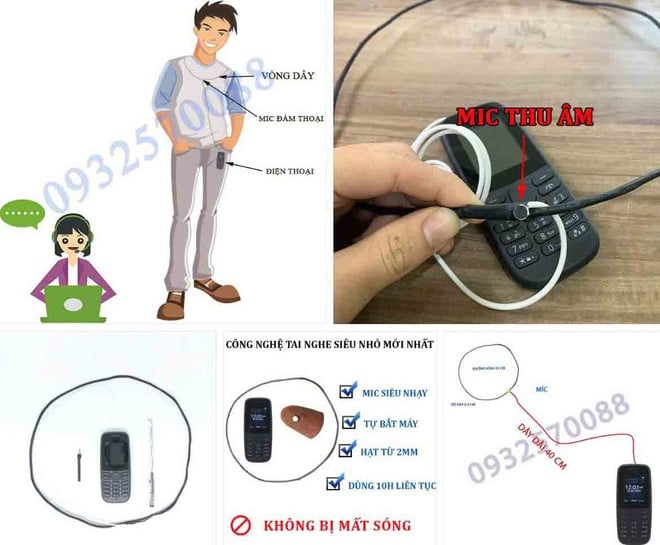
Micro devices serve a variety of purposes, including exam cheating.
PHOTO: NL
"We're closed," a seller named T. said bluntly, even though he had previously frequently posted ads for selling micro-sized products on social media.
Notably, a unit named TNSN introduced itself as having 4 stores in Hanoi advertising the sale of a type of super small headphones cleverly disguised in Casio calculators that can "automatically answer the phone without making any noise", "suitable for prompting" and "can still be used as a normal handheld calculator". Specifically, the calculator will act as a phone, can insert a SIM card and connect directly to the super small headphones.
According to the seller's instructions, when entering the exam room, the candidate needs to press the start button hidden underneath, and at the same time wear a super small headset in the cochlea to be able to communicate directly with the outside world throughout the exam because the "mic is very sensitive". The price of this type of machine is 2.5 million VND, but when we contacted to order, the store said it was "closed until the end of June" and refused to communicate further despite our repeated requests.
Another notable point is that we have not yet found any cheating support devices related to AI. Current devices are mainly disguised in familiar exam room objects such as pens, calculators, buttons, glasses... and often have the same "operating principle": Wear super small headphones and use camouflaged devices to transmit sound, even transmit images to the outside to ask for support.
The cost of the above equipment ranges from several million VND for sale price, and several hundred thousand VND for rental price.
However, the above reality may just be the tip of the iceberg. Because, in the conference on training on inspection and examination of the 2025 high school graduation exam for the Departments of Education and Training and higher education institutions, Deputy Minister of Education and Training Pham Ngoc Thuong especially emphasized the risk of using high-tech devices and AI to cheat on exams. This is also the topic that localities emphasized when organizing training on exam invigilation and examination.
Most recently in mid-June, Lam Dong Provincial Police said they had discovered a trick using AI technology embedded in shoe soles to return to the test questions and then use AI to solve them. This is the reason why the Ministry of Education and Training and the Ministry of Public Security have had, are having, and will continue to have many plans to prevent, stop, and handle cases of intentionally using high technology to commit cheating.
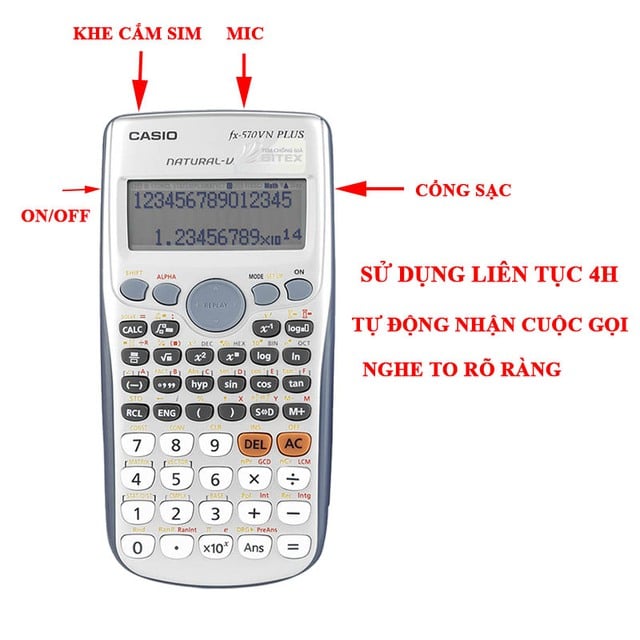
There are tiny headphones cleverly disguised in computers.
photo: screenshot
Proposed way to "fight AI"
Concerns about the use of AI in exam rooms are well-founded as solving questions in the high school graduation exam using AI tools is becoming easier and easier, according to Master Nguyen Quoc Toan, a PhD student specializing in AI at the University of Technology Sydney (UTS, Australia). "To ensure exam fairness, preventing cheating, including the use of AI, is absolutely necessary," Toan emphasized.
According to Mr. Toan, most of the popular AI generators currently require an internet connection to operate (such as ChatGPT or Gemini - PV ), so implementing technical measures to prevent internet access in sensitive areas combined with signal testing would be appropriate. "Although some models that can be deployed directly on mobile devices have appeared, they are not popular and still face many limitations when handling highly academic questions in high school graduation exams," Mr. Toan informed.
Based on this reality, he proposed two methods to "isolate" AI from the exam room. First, the exam site can deploy jamming devices or apply technical measures to limit signals in areas under exam supervision, especially the restroom area, the only place not under direct supervision and easily exploited for cheating.
"The use of jamming devices needs to be carefully considered because it can affect the communication system at the exam site, so it should only be deployed in locations where it is truly necessary," said Mr. Toan.
Second, in the exam room, the invigilator can use a wave detector to detect suspicious mobile signals and randomly check during the exam. This device is capable of detecting the presence of transmitting devices, such as mobile phones, wireless headphones or mini wifi transmitters. Each exam site only needs to be equipped with a few devices to support monitoring work, according to Mr. Toan.
From a service provider perspective, Master Bui Manh Hung, founder and operator of Aiducation, said that in the final weeks before the exam, his platform recorded a sharp increase in traffic and frequent use, most notably in the AI-powered personal education assistant service. This also reflects the risk of TS using AI to cheat on exam day regardless of broadcast disruption or other exam proctoring operations.
Citing the story of many Chinese technology companies temporarily suspending services or restricting some features of AI generators such as DeepSeek and Doubao to prevent cheating in the country's university entrance exams, Mr. Hung suggested that Vietnam could also implement similar regulations during the high school graduation exam. This is an effective method, helping to prevent the problem from the "root", according to Mr. Hung.
"I hope that there will soon be a mechanism for technology companies like us to coordinate with the Ministry of Education and Training and relevant agencies, so that we can simultaneously suspend the provision of related AI services to ensure the honesty and seriousness of the exam. In the immediate future, we commit to temporarily suspending features related to solving problems during the high school graduation exam days so that the tool is not used for cheating," Mr. Hung affirmed.
On the other hand, the leader of a high school in Ho Chi Minh City noted that recently, authorities have warned about cheating tricks using high technology, including AI, to take pictures and solve questions. These acts are all serious violations of exam regulations and will be severely dealt with, such as suspension from the exam, zero points, or cancellation of the entire exam results, and not being considered for high school graduation, according to the leader.
China uses AI to fight fraud
According to China Central Television (CCTV), during the 2025 university entrance exam, many localities in the country have deployed AI monitoring technology in all exam rooms to detect unusual behavior of both candidates and supervisors. Many behaviors such as finishing the exam early, turning around, moving objects of candidates or handling the exam incorrectly, standing too close to the examiner are all recognized and recorded by AI, then strictly handled according to regulations.
Outside of the exam sites, China has also increased entrance checks such as using biometric recognition technology, checking electronic devices, installing signal jammers... to prevent cheating in the country's largest exam, which attracts more than 13 million candidates.
Source: https://thanhnien.vn/nguy-co-dung-ai-gian-lan-thi-tot-nghiep-thpt-cach-gi-ngan-chan-185250619223239477.htm




![[Photo] Da Nang: Hundreds of people join hands to clean up a vital tourist route after storm No. 13](https://vphoto.vietnam.vn/thumb/1200x675/vietnam/resource/IMAGE/2025/11/07/1762491638903_image-3-1353-jpg.webp)




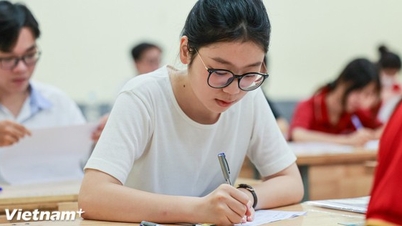




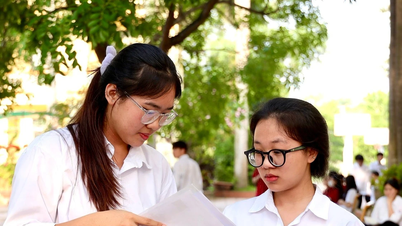



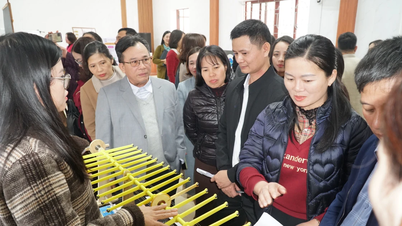







































































![[Photo series] Bu Gia Map National Park "tells stories" of changing seasons](https://vphoto.vietnam.vn/thumb/402x226/vietnam/resource/IMAGE/2025/11/08/1762556754197_ttttttttttttttttt_20251107112659.jpeg)




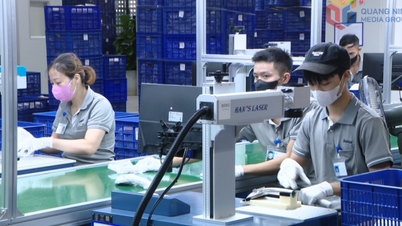
















Comment (0)